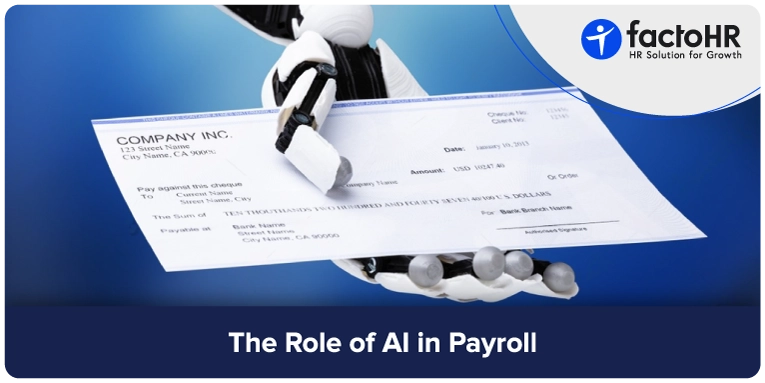The Role of AI in Payroll: Benefits, Uses, and Practical Tips

Table of Contents
Artificial intelligence is transforming the way businesses operate. The influence of new technologies such as digital assistants, automated robotic processes, and generative AI is felt across all industries, business operations, and professions, including human resources and AI in Payroll.
Artificial intelligence and machine learning can accelerate traditional employee payment processing. Employers who use AI in payroll processing eliminate the need to handle salary data, reducing the potential for human error.
Employee salary administration is a critical function that every organization must undertake. It is a complex procedure that presents organizations with various issues in tracking employee payments and managing data accuracy. This article discusses AI in Payroll, its benefits, uses, and implementation tips. Read more to learn more!
What is AI in Payroll?
Payroll automation utilizes technology to streamline and manage an organization’s salary procedures. This entails employing software to manage everything, including calculating wages and tax deductions and generating pay stubs. Automatic pay solutions reduce administrative overhead, prevent errors, and maintain regulatory compliance. Artificial intelligence and machine learning improve employee salaries by enabling intelligent decision-making.
This predictive power not only lowers errors but also speeds up pay processing. Furthermore, AI-powered systems have AI features in payroll management that can automate tedious jobs like data input, allowing human resources to perform more critical activities. factoHR’s AI payroll software can help you and your organization use and manage payroll seamlessly.
Traditional payment management systems, sometimes hampered by manual processes, must catch up with the constant changes in worldwide financial legislation. Payroll errors can result in considerable financial penalties and employee unhappiness. Furthermore, the requirement for real-time data handling and reporting in a global setting adds another level of complexity. In this complex context, artificial intelligence is emerging as a game changer.

Benefits of AI in payroll
Improved Accuracy
These technologies simplify data processing, decreasing errors while ensuring accurate salary computations, tax deductions, and compliance. This reduces the strain of manual data entry and the possibility of errors, allowing professionals to devote more time to strategic duties.
Compliance Management
AI in Payroll automates compliance operations by monitoring and tracking changing rules. This function keeps professionals updated on changing regulations, lowering compliance risks, and decreasing administrative burdens.
Quick Query Resolution
Conversational AI, such as chatbots for HR with capabilities, effectively handles employee inquiries around the clock. Employees get rapid and precise responses, which saves time and reduces irritation.
Personalized Employee Engagement
Artificial intelligence in Payroll solutions can provide employees personalized reports, insights into their income, and even forecast salary modeling based on performance data. This level of personalization leads to a more engaged and inspired staff.
Streamlined processes
Automating repeated procedures simplifies processing, saving time and resources. Financial specialists may now manage payroll for a larger workforce while maintaining accuracy and efficiency.
Cost Savings
Consider the potential cost savings. Error elimination, increased efficiency, and less human intervention reduce operational expenses. Your firm would only spend money on a salary automation system, which is a profitable investment in the long term.
Increasing Employee Morale
Salary processing with Artificial intelligence is accurate and efficient. It results in timely and error-free payments, guarantees employees are rewarded on time, and enhances morale and satisfaction.
Data-Driven Planning
AI Can Enhance HR Practices through AI-powered data analysis. It gives valuable insights, allowing payroll professionals to make informed decisions. Identifying patterns and trends simplifies payroll planning and allows for more proactive planning.

Uses of AI in Payroll Management
Automatic Data Entry
It can automatically collect and enter data from various sources, including attendance systems, personnel databases, and tax forms. This reduces errors from manual data entry and saves time.
Time and Attendance Management
All must understand the importance of time and attendance management in an organization. Automated systems may handle clock-in and clock-out data, apply business rules, and detect patterns or anomalies, lowering the likelihood of errors and fraudulent clocking. As a result, time and attendance tracking becomes more efficient.
Fraud Detection And Prevention
These automation systems can analyze data to detect unexpected trends indicating fraud or errors. For example, it can discover disparities in extra hours, duplicate payments, or other abnormalities and alert you to them so you can act quickly.
Continuous Learning And Progress
These systems can continuously use historical data to increase accuracy and efficiency. These machine learning algorithms adjust to changing patterns and laws, optimizing procedures over time.
Employee Self-Service
Employees can use self-service portals to view and manage their information, including payslips, tax forms, and benefits. This empowers employees while reducing HR personnel’s administrative workload.
Tax Compliance And Reporting
It can help businesses comply with tax laws by automatically updating payment systems with the most recent rules and regulations. It can also help generate correct tax reports and guarantee that tax filings are completed on time.
Employee Benefit Management
It assists businesses in better managing employee benefits by automating computations, deductions, and payments for benefits such as health insurance, retirement programs, and other incentives. This guarantees that employees receive appropriate benefits and deductions.
Chatbots for Employee Issues
AI-powered chatbots can handle common questions from employees, such as checking pay stubs, updating personal information, and comprehending tax deductions. According to Forbes data, 52% of organizations use AI chatbots to increase productivity. This decreases the workload for the HR and payroll departments.
Data Validation And Cleaning
The data can be normalized using artificial intelligence algorithms that search for outliers, errors, and omissions. This ensures that the data used in computations are accurate and reliable since they have been independently verified.
Forecasting and Analytics for Workforce Planning
Algorithms can help organizations forecast future workforce requirements based on historical salaries and employee records. They can also help formulate strategic direction in finance and human resource management.

Tips for using AI in Payroll
AI in Payroll processing is a transformational endeavor that demands meticulous preparation and execution. Here are a few suggestions for using automated employee salary solutions to get you started:
- Any firm serious about embracing and applying AI in its human resources and pay operations must first try to comprehend artificial intelligence’s true nature and possibilities.
- Organizations are primarily concerned about privacy and confidentiality when using AI in HR. Information could be utilized to improve the artificial intelligence model, leaving HR and payroll directors to assess any confidentiality threats.
- HR professionals can use AI to review staff policies and swiftly design new ones.
- AI-powered systems can assist here by automatically conducting employee engagement surveys and evaluating the results, providing HR with the information needed for employee engagement programs.
- Firms should conduct a thorough risk-benefit analysis before integrating AI in HR and payroll.
Challenges in Adopting AI in Payroll Management
Data Security And Privacy Issues
The database includes but is not limited to the employees’ names, addresses, and financial records. Mitigating risks associated with this data is relevant, as is the security and privacy of such data. They pointed to the need for organizations that use AI in Payroll to ensure that the systems have enhanced security measures to prevent unauthorized access to employee records.
Integration Into Existing Systems
Integrating AI-powered programs with existing HR, employee time and attendance, and accounting software can be challenging. Compatibility difficulties and data migration concerns may necessitate careful preparation and collaboration.
Employee Acceptance and Understanding
Employees may be concerned about automation taking over specific duties, such as salary processing. Companies must communicate the benefits of AI and provide appropriate training to ensure that employees comprehend the system and its advantages.
Change Management
Change management is an essential function in every organization when implementing new technology. Employees may resist change, primarily if used to traditional payroll procedures. Effective change management tactics are critical for overcoming resistance and ensuring a smooth transition to AI-powered solutions.
Unexpected Challenges And Downtime
Installing automation systems occasionally involves challenges, such as technological malfunctions or disruptions. Organizations must, therefore, address sensitive issues in short and efficient contingency measures.
Reliability Of Vendor
Relying on third-party vendors for artificial intelligence solutions places a premium on their dependability and support. To ensure a strong and sustainable alliance, businesses must carefully analyze their vendors’ track records, support services, and capabilities.
Skill Gaps And Training
Organizations may need more staff with the skills to develop and manage AI-powered solutions. Training current employees or employing qualified professionals can be time-consuming and costly.
Conclusion
The use of AI in payroll management has significant promise for improving efficiency, accuracy, and strategic decision-making inside enterprises. Artificial intelligence solutions can streamline the entire process by automating mundane processes, analyzing complicated data patterns, and providing predictive insights. This decreases the possibility of errors and enables HR staff to focus on other valuable activities. Thus, all the organizations using it can benefit the most from AI-powered payroll platforms.
As AI technology advances, firms that effectively use it in payroll administration will gain a competitive advantage in terms of operational excellence, employee happiness, and resource allocation. Finding the correct mix between automation and human control is critical for creating a seamless and effective employee salary ecosystem. Learn more about the factoHR payroll system; you can schedule a demo with us now!

FAQs
How Is Artificial Intelligence Applied In Payroll?
These algorithms can validate and cleanse the data, finding anomalies, inaccuracies, and missing information. This guarantees that the data utilized in salary computations is correct and dependable.
Is Artificial Intelligence Taking Over Payroll?
Using predictive analytics, AI may elevate payments to new heights. By analyzing previous data, these systems can estimate all expenses, allowing organizations to manage budgets better and plan for future financial responsibilities.
Is the Payroll Going to Be Automated?
Automation is already a key component of modern systems. Time tracking, tax calculations, and direct deposits are automated tasks that increase productivity and eliminate human error daily. However, automation is intended to support Managers rather than replace them.
Which Trends Are Influencing the Future of Payroll Automation?
A variety of trends influence the future of automation. The most significant trends are the increased adoption of AI, blockchain technology, mobile payment systems, and financial wellness programs. Workable automates employee salaries using artificial intelligence and machine learning.
How Secure Are Automated Payroll Systems?
Automatic systems contain extensive security measures to protect sensitive employee data, such as data encryption, secure access controls, and regular data backups. As a result, information is kept safe from unauthorized access or cyber threats.
How Does AI Improve Payroll Automation?
It improves automation in numerous ways, including predictive analytics, anomaly detection, compliance monitoring, and personalized employee experiences. These aspects improve an organization’s human resource functions, which boosts its growth and profitability.
Grow your business with factoHR today
Focus on the significant decision-making tasks, transfer all your common repetitive HR tasks to factoHR and see the things falling into their place.

© 2025 Copyright factoHR


